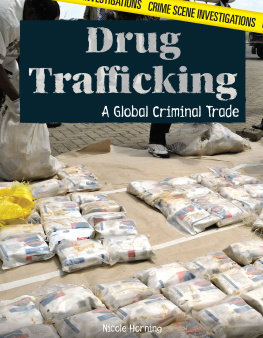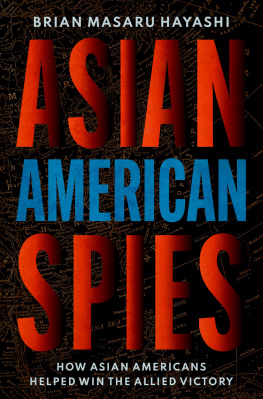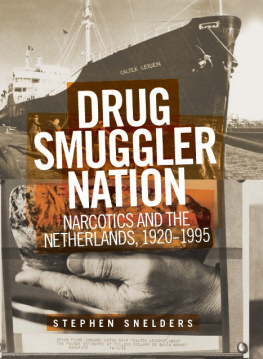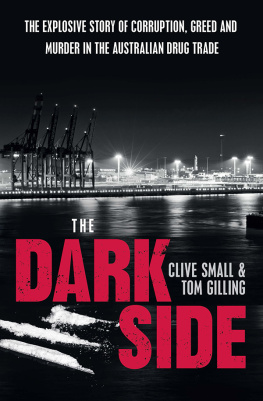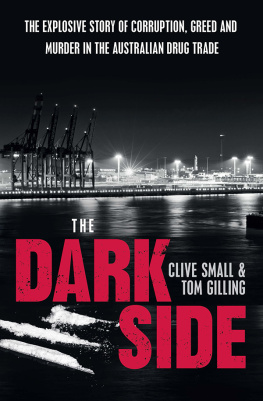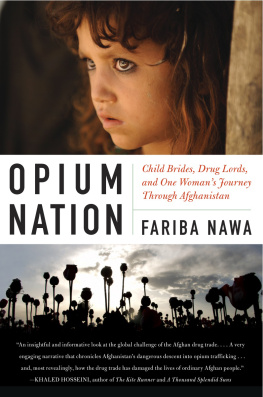ABOUT THE AUTHORS
Kathryn Meyer received her B.A. from the University of Vermont and her Ph.D. from Temple University. She has taught East Asian history at Temple UniversityJapan, Ohio Wesleyan University, Lafayette College, and Wright State University, where she is assistant professor of history. In 1990, she was awarded a National Endowment for the Humanities fellowship that supported research for this book. She lives in Dayton, Ohio.
Terry Parssinen received his B.A. in History from Grinnell College and his M.A. and Ph.D. in the History of Ideas program from Brandeis University. He has taught at Grinnell College, Temple University, the University of Maryland, College Park, and he is presendy professor of history at the University of Tampa. His previous book is entitled Secret Passions, Secret Remedies: Narcotic Drugs in British Society, 18201930 (ISHI Publications, 1983).
ACKNOWLEDGMENTS
W e are grateful to the following institutions and persons, without whose assistance we could not have written this book.
For research funding and support: the National Endowment for the Humanities; Lafayette College junior faculty leave program; the Center for Chinese Studies at the University of California, Berkeley; Temple University Faculty Research Fund; University of Maryland Office of the Dean of Undergraduate Studies; and the Dana Faculty Research Fund of the University of Tampa.
For referring us to sources and assisting us in archives: Annie K. Chang, Alison Altstatt, and Jeff Kapellas, all of the Center for Chinese Studies Library at the University of California, Berkeley, gave valuable advice and important leads and kept Kathryn well fed and cheerful through a critical year of research; Mark Haller of Temple University gave us some important references to smuggling from Cuba in the 1920s; and William O. Walker III of Florida International University made us aware of the existence of the State Department name files of international narcotics traffickers. Kathryn was warned that, as a woman writing about the military, she would have difficulties doing research in Japan. However, this did not prove to be the case, as many Japanese colleagues provided generous assistance. In particular, Kathryn wishes to acknowledge Imura Tetsuo, Professor of Humanities, Niigata University, Niigata, Japan, whose encyclopedic knowledge of Japanese military and colonial archives in Japan and the United States helped her locate the documents to piece together the Japanese side of the story and Tanaka Harumi of the Japanese National Defense Academy, Yokosuka, Japan, who provided her with valuable criticism and encouragement.
For reading and critieizing the manuscript in whole or in part: David Courtwright of the University of North Florida; David Musto of Yale University; Alan Block of Penn State University; Frederic Wakeman Jr. of the Institute of East Asian Studies of the University of California, Berkeley; Jonathan Marshall of the San Francisco Chronicle ; Andy Solomon of the University of Tampa; Mark Haller and Allen Davis of Temple University; Corinne Lyman of Ohio Wesleyan University; William O. Walker III of Florida International University; Elizabeth Perry of Harvard University; and William Miles of the Department of Chemistry, Lafayette College, who helped us understand some of the technical aspects of narcotics processing.
For encouragement and sustenance: Peter and Barbara Ilias, for providing Terry with housing during research in London; Yoko Maeda, for providing Kathryn with housing during research in Tokyo; Betsy Meyer, Sarah Meyer, and Scott MacKay for providing room, board, and encouragement in Washington D.C.; Higashihara Fumikaze for cheering us on and running last minute errands in Tokyo; Diana Boxer; and especially Carol Parssinen.
BIBLIOGRAPHY
Abadinsky, Howard. Organized Crime . Boston: Allyn and Bacon, 1981.
Adler, Patricia. Wheeling and Dealing: An Ethnography of an Upper Level Drug Dealing Community . New York: Columbia University Press, 1989.
Akimoto Shunkichi. Manchurian Scene . Tokyo: Taisho Eibunsha, 1933.
Arlacchi, Pino. Mafia Business: The Mafia Ethic and the Spirit of Capitalism . London: Verso, 1987.
Assam Opium Enquiry Committee. Assam Congress Opium Committee Report . N.p., 1925.
Bamba, Nobuya. Japanese Diplomacy in Dilemma: New Light on Japans China Policy, 19241929 . Vancouver: University of British Columbia Press, 1977.
Beasley, W. G. The Meiji Restoration . Stanford, Calif.: Stanford University Press, 1972.
. The Rise of Modern Japan . New York: St. Martins, 1990.
Beeching, Jack. The Chinese Opium Wars . London: Hutchenson of London, 1975.
Bendiner, Elmer. A Time for Angels: The Tragicomic History of the League of Nations . New York: Knopf, 1975.
Block, Alan. European Drug Trafficking between the Great Wars: Developing Illicit Markets and Criminal Syndicates. Journal of Social History 23 (Winter 1989): 31537.
Block, Alan, and William Chambliss. Organizing Crime . New York: Elsevier, 1981.
Bruun, Kettil, Lynn Pan, and Ingemar Rexed. The Gentlemens Club: International Control of Drugs and Alcohol . Chicago: University of Chicago Press, 1975.
Broomhall, B. The Truth about Opium Smoking . London: Hodder and Stoughton, Paternoster Row, 1882.
Cai Shaoqing. Minguo Shiqi de Tufei [Bandits in the republican era]. Beijing: Zhungguo Renmin Daxue Chubanshe, 1993.
Campbell, Rodney. The Luciano Project . New York: McGraw Hill, 1977.
Chen, Jerome. Yuan Shih-kai . Stanford, Calif.: Stanford University Press, 1972.
Chen Li-fu. Storm Clouds Clear over China . Palo Alto, Calif.: Hoover Institution on War, Revolution, and Peace, 1994.
Chen Yung-fa. The Blooming Poppy under the Red Sun: The Yenan Way and the Opium Trade. In New Perspectives on the Chinese Communist Revolution , edited by Tony Saich and Hans van de Ven, 26398. Armonk, N.Y.: Sharpe, 1995.
Chi, Hsi-sheng. Warlord Politics in China, 19161928 . Stanford, Calif.: Stanford University Press, 1976.
China: Inspector General of Customs. Opium: Historical Notes or the Poppy in China . Special Series, no. 13. Shanghai: Kelly and Walsh, 1889.
Chinese Peoples Foreign Relations Society. Menace to the Peace of the Far East . N.p., 1921.
Clubb, O. Edmund. Twentieth Century China . New York: Columbia University Press, 1964.
Coble, Parks. Facing Japan: Chinese Politics and Japanese Imperialism, 19311937 . Cambridge, Mass.: Harvard University Press, 1991.
Collis, Maurice. Foreign Mud . New York: Knopf, 1946.
Courtwright, David. Dark Paradise: Opiate Addiction in America before 1940 . Cambridge, Mass.: Harvard University Press, 1982.
Courtwright, David, Don Des Jarlais, and Herman Joseph. Addicts Who Survived: An Oral History of Narcotic Use in America, 19231965 . Knoxville: University of Tennessee Press, 1988.
De Quincey, Thomas. Confessions of an English Opium-Eater and Other Writings . New York: Oxford University Press, 1985.
Du Yingmo. Shanghai Wenren Du Yuesheng [Du Yuesheng, a Shanghai VIP]. Taipei: Mingwang Chubanshe, 1987.
Eguchi Keiichi. Nitchu Ahen Senso [The Japanese-Chinese opium war]. Tokyo: Iwaname Shoten, 1989.
Ellickson, Phyllis L. and Robert M. Bell. Drug Prevention in Junior High: A Multi-Site Longitudinal Test, Science . March 16, 1990.
Fay, Peter Ward. The Opium War, 18401842 . Chapel Hill: University of North Carolina Press, 1975.
Fogel, Joshua, trans. A Life along the South Manchurian Railway: The Memoirs of Ito Takeo . Armonk, N.Y.: Sharpe, 1988.



